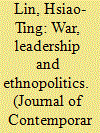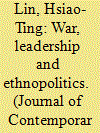| Srl | Item |
| 1 |
ID:
086305


|
|
|
|
|
| Publication |
2009.
|
| Summary/Abstract |
This article examines how China's war with Japan served as a crucial factor that shaped modern China's ethnopolitics. It argues that the Japanese invasion of China in 1941-1945 provided the Nationalists with an unprecedented opportunity to push their authority further westward into the Central Asian heartlands. The Nationalists' marching westward as a result of the Japanese invasion also urged them to factor frontier and ethnopolitics into their wartime strategic thinking and institutional reforms. To a great extent, the war and its repercussions caused a redefinition of modern China's border security and defense in both northwestern and southwestern China. The war with Japan turned the Nationalists westward, a new perspective which shifted the power relationship between the Nationalists and China's frontier regional leaders. This historical phenomenon resulted in the extension of Nationalist power to, and the building of, new institutions and infrastructures, in China's remotest ethnic frontier. It also contributed to modern China's first contact with the Middle East. The westward expansion during wartime also transformed modern China from a maritime economy rooted in East Asian trade to a continental one based on overland trade routes through the heartland of Asia.
|
|
|
|
|
|
|
|
|
|
|
|
|
|
|
|
| 2 |
ID:
086322


|
|
|
|
|
| Publication |
2009.
|
| Summary/Abstract |
This article examines how China's war with Japan served as a crucial factor that shaped modern China's ethnopolitics. It argues that the Japanese invasion of China in 1941-1945 provided the Nationalists with an unprecedented opportunity to push their authority further westward into the Central Asian heartlands. The Nationalists' marching westward as a result of the Japanese invasion also urged them to factor frontier and ethnopolitics into their wartime strategic thinking and institutional reforms. To a great extent, the war and its repercussions caused a redefinition of modern China's border security and defense in both northwestern and southwestern China. The war with Japan turned the Nationalists westward, a new perspective which shifted the power relationship between the Nationalists and China's frontier regional leaders. This historical phenomenon resulted in the extension of Nationalist power to, and the building of, new institutions and infrastructures, in China's remotest ethnic frontier. It also contributed to modern China's first contact with the Middle East. The westward expansion during wartime also transformed modern China from a maritime economy rooted in East Asian trade to a continental one based on overland trade routes through the heartland of Asia.
|
|
|
|
|
|
|
|
|
|
|
|
|
|
|
|